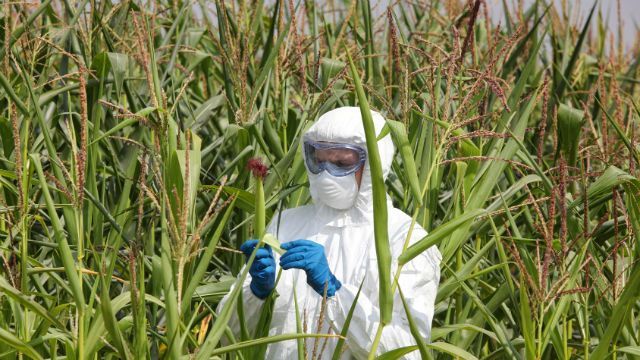
As weeds become more and more resistant to herbicides, biotech corporations seem determined to keep this cycle going by – you guessed it – developing new genetic modifications that lead to even more herbicides.
The new GMOs that the USDA has recommended for approval are corn and soy that are immune to 2,4-D, an ingredient used in the infamous Vietnam War era Agent Orange.
Although 2,4-D was only part of Agent Orange, a chemical weapon used during the Vietnam War to destroy crops and forests, and not the most dangerous part, it still has been found to have a laundry list of potential dangerous effects.
It is widely used as an herbicide in the US, and the new GMO corn and soy, brand named “Enlist” by Dow AgroSciences, makes the crops immune to the 2,4-D. This allows farmers to coat their fields in 2,4-D, without the corn and soy being damaged.
Wenonah Hauter, the executive director of Food & Water Watch, said in a statement: “Many studies show that 2,4-D exposure is associated with various forms of cancer, Parkinson’s Disease, nerve damage, hormone disruption and birth defects. USDA must take these significant risks seriously and reject approval of this crop.”
Food & Water Watch also states that the 2,4-D resistant crops could lead to skin sores, liver damage, compromised growth and development, lower sperm counts, non-Hodgkin’s lymphoma and cell damage.
According to this non-profit organization, these crops could also lead to further weed resistance, increased pesticide use, and the spread of the herbicide to nearby crops and wild foliage. This unintentional drift to other plants outside the sprayed area could significantly affect all stages of the food chain.
Dow AgroSciences’ argument in favor of the resistant crops is that the increased use of 2,4-D would minimize mechanical tillage procedures by farmers, which, according to the USDA’s assessment, “releases a lot of greenhouse gas and leads to topsoil erosion and water pollution.” The statement adds, “however, on the negative side, farmers will be spraying more herbicide.”
According to Nathanael Johnson of Grist.org, “we’ve got to figure out a better way of doing conservation tillage rather than just relying on more and more herbicides. It would be nice if the government could use its regulatory authority to promote big-picture solutions. But in this case, the USDA is firmly focused on the small-picture tradeoff between tilling and herbicide. And in that small picture, it has determined that tilling is more harmful.”
The USDA’s decision is currently in the midst of a public comment period that ends on April 27. So far, over 140 advocacy groups have made their voices heard, and have written letters to USDA secretary Tom Vilsack, urging him to reject Dow’s application. The Center for Food Safety has begun a national campaign to raise public awareness and hopefully stop the approval of this crop.
 With any luck, someday our lawmakers will see that the cycle of developing new herbicides – which lead to more GMO’s – which lead to even more herbicides – is not the way to feed our planet. Hopefully this realization will come before it is too late.
With any luck, someday our lawmakers will see that the cycle of developing new herbicides – which lead to more GMO’s – which lead to even more herbicides – is not the way to feed our planet. Hopefully this realization will come before it is too late.
-The Alternative Daily
Sources:
http://www.care2.com/greenliving/what-exactly-are-agent-orange-gmos.html
http://www.huffingtonpost.com/2012/04/26/enlist-dow-agent-orange-corn_n_1456129.html
http://grist.org/food/the-dirt-on-the-agent-orange-gmos-youve-been-hearing-so-much-about
https://www.foodandwaterwatch.org/food/genetically-engineered-foods/24-d-corn
http://www.centerforfoodsafety.org/press-releases/2875/center-for-food-safety-launches-campaign-to-stop-dow-chemicals-agent-orange-crops

